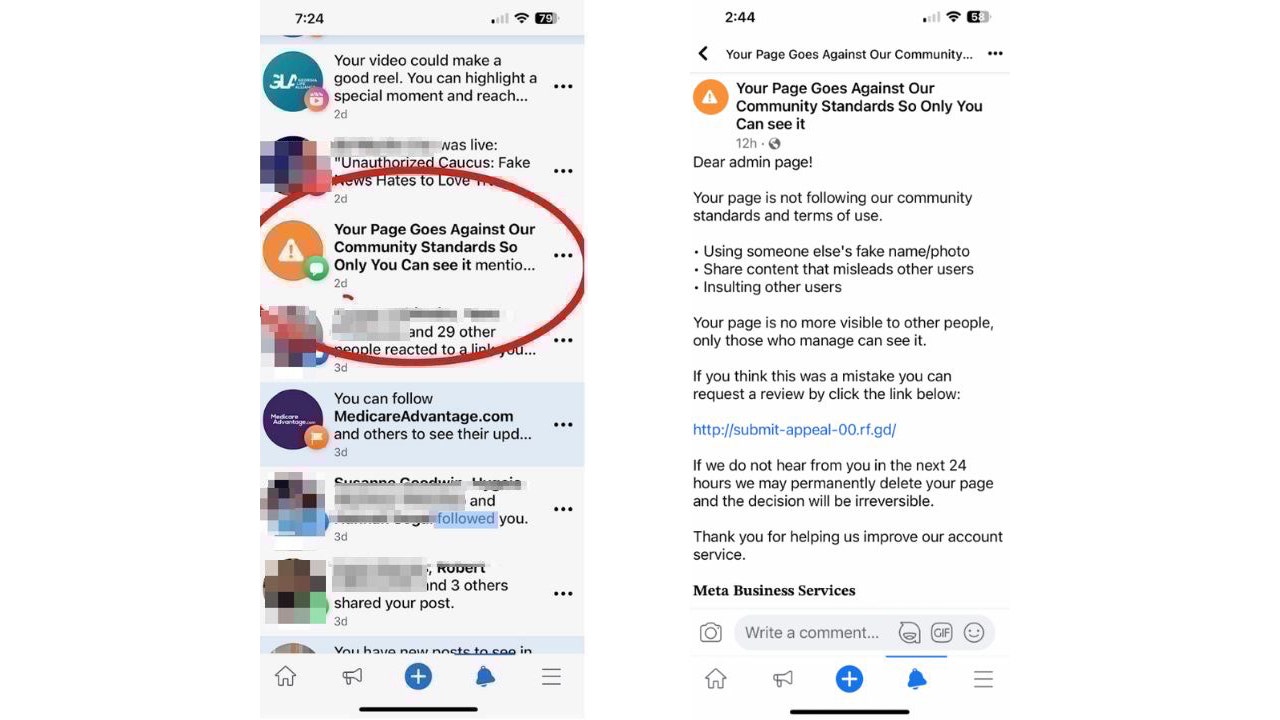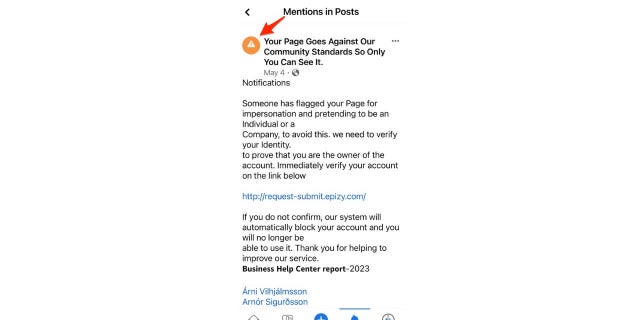
In the fast digital age we live in, protecting ourselves from online dangers has become an essential part of our daily lives. Furthermore, with the ever-changing nature of social media platforms, we find ourselves confronted with a barrage of dodgy schemes and cunning tactics designed to fool people like you and me. My mission is to identify these ongoing network issues and let you know how to stay safe amidst the rising dangers.
Recently, one of our vigilant readers, Claire from Roswell, Georgia, contacted us to share a phishing scam she had received. Here’s what she had to say.
“Now there is a new trend Facebook and Instagram The position where the message is displayed in the notification. It looks like a real message from FB or IG because it’s in your notification (it’s in my organization’s page notification.) But it appears to be phishing. Nice to see a section on your website dedicated to warning about these sneaky social media tricks. Thank you for all you do and your protective software. I signed up today! “
-Claire, Roswell, Georgia
Don’t be fooled by this sneaky notification that’s tricking people on Facebook and Instagram (Cyberguy.com)
Scammers have started using social media on a regular basis to trick people into giving them money, private information, and more. It’s a relatively new scam that pops up on people’s social media quite often. I want to point out some red flags in these screenshots.
So, let’s take a look at what to check, how to know if you’ve been scammed, and how to protect yourself.
What to pay attention to:
Learn about the Community Guidelines
Every social media platform has community guidelines to ensure the safety of those who use the platform. There are rules about impersonating someone else, posting violent or offensive content, and more that violate these guidelines. However, if you post content or run a page that violates the guidelines, Posts or pages are usually deleted immediately.
Disturbing malware threat spreads on Facebook and Twitter
If you noticed in the second screenshot above, the fake notification states, “If we do not hear from you within the next 24 hours, we may permanently delete your page, and this decision will be irreversible.” If the notification really came from Facebook, they wouldn’t have alerted the person and given them 24 hours to respond.

Don’t be fooled by this sneaky notification that’s tricking people on Facebook and Instagram (Cyberguy.com)
Additionally, phishing emails often contain grammatical errors, misspellings, or use generic greetings.
Platforms like Facebook, Instagram, TikTok, etc. will immediately delete a post or page if found to be violating the guidelines. They may send you a message after the fact explaining why they deleted the post, but they never give you a chance to explain yourself before deleting the post.
HOW TO CHANGE PASSWORD ON FACEBOOK
pay close attention to hyperlinks
If you notice again in the second screenshot above, the scammers provided a link for the person to click to “request a review” of their page and save it from being removed.
The link could be malicious and, if clicked, could cause you to download malware instead of your device, or take you to a bogus page that asks you for a lot of personal information. Make sure to always double check the entire link before clicking it. Do not click on links or download files from unfamiliar sources, especially if they were sent to you in private messages or notifications. Hover over a link to see a preview of the URL, but don’t click if you’re in doubt.
See who sent you notifications
What is two-factor authentication and should I enable it
If you get an urgent notification from Facebook, it would make sense for the page sending you the notification to at least have Facebook’s logo as a profile picture, right? Notice how “Urgent Notification” comes from a page that only has an orange exclamation point as its profile photo. This is just another scare tactic scammers use to make notifications seem urgent so that victims take immediate action. Always first verify that the notification is coming directly from the social media platform itself.

Don’t be fooled by this sneaky notification that’s tricking people on Facebook and Instagram (Cyberguy.com)
how to protect yourself
Enable two-factor authentication
Enable two-factor authentication (2FA) on your social media accounts to add an extra layer of security. That way, even if someone gets your password, they’ll still need a second way to verify it’s your account (eg, a unique code sent to your phone) to access your account.
keep software up to date
5 Ways to Remove Creepy Clickbait Ads from Your Instagram Feed
Make sure you regularly update your devices and apps with the latest security patches. This helps prevent known vulnerabilities that scammers could exploit.
For more information on my scam alerts, subscribe to my FREE CYBERGUY REPORTS newsletter by going to CYBERGUY.COM/Communication
Install good antivirus software on all your devices
If you have good antivirus software installed, you can keep hackers out of your device. Having antivirus software on your device will ensure that you do not click on any potentially malicious links that could install malware on your device, allowing hackers to access your personal information.
Check out my expert reviews of the best antivirus protection for Windows, Mac, Android, and iOS devices by going to CyberGuy.com/LockUpYourTech
Free Antivirus: Should You Use It?

Best Antivirus Protection Advice From Kurt “The Cyberguy” Knutsson (Fox News)
final thoughts
I want to thank Claire for bringing this phishing scam to our attention. As you can see, social media platforms have become a breeding ground for scammers trying to scam unsuspecting users. It is vital to remain vigilant and heed the warning signs. From reviewing notifications and hyperlinks to verifying sources and having strong antivirus software, taking proactive steps is key to protecting your online presence and personal information.
Click here for the Fox News app
Should the government do more to protect Americans from such hackers?tell us by writing CyberGuy.com/Contact
For more of my tips, subscribe to my free CyberGuy Reports newsletter by going to CyberGuy.com/Newsletter
Copyright 2023 CyberGuy.com. all rights reserved.







